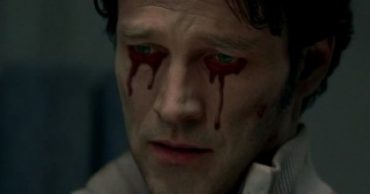 “I really don’t see what was the point of that,” says a woman (who I presume is Terry’s mother) after Big John sings a prolonged dirge. As I watch True Blood‘s “Life Matters,” I can’t help but feel the same. For the penultimate episode of a season, “Life Matters” is a remarkably poor showing. No character’s death should receive this kind of treatment, let alone an ancillary character.
“I really don’t see what was the point of that,” says a woman (who I presume is Terry’s mother) after Big John sings a prolonged dirge. As I watch True Blood‘s “Life Matters,” I can’t help but feel the same. For the penultimate episode of a season, “Life Matters” is a remarkably poor showing. No character’s death should receive this kind of treatment, let alone an ancillary character.
Terry Bellefleur’s funeral completely hijacked True Blood this week in a way that felt not only excessive but plainly desiccated. I was actually surprised to see the shot of Arlene in black; I thought most of this was behind us already. Terry died three episodes back. We have subsequently spent a portion of the following two episodes dealing with the aftermath in what I thought was sufficient manner. Do we really still need to dwell on this? Are there any meaningful statements to be made about it?
Answer: No, there are not.
What we end up with is a series of flashbacks that add nothing to our understanding of Terry. OK, maybe that is unfair. I had no idea that Terry was such a fervent acolyte of Raging B***h IPA. But that’s about it, folks. It also gives the writers of True Blood a blatant opportunity to shoehorn the theme of this episode in: When Terry catches a catfish with Sam and Andy, he looks into the dying fish’s eyes and insists that they throw him back into the water. “Every life matters,” he says gravely.
Let’s quantify the best and worst speech, shall we? The best speech is easily Lafayette’s. Lafayette talks about the first time he met the seemingly catatonic Terry at Merlotte’s. Lafayette purportedly looked into his soul (not unlike the time George W. Bush looked into Vladimir Putin’s soul) and determined that Terry was a swell guy. He then explicated his voguish technique for cooking fries to the struggling Terry, in which you can either “sexy the dip” or “cha cha the dip.”
“And within 15 minutes, he had me swingin’ higher and faster than any of my friends at school. That’s my Terry story.”–Porsche
I don’t think I’ve ever seen someone bomb so resounding at a funeral in my life. In this story, Terry taught Porsche, who was then a child, how to swing. She recalled being very diffident about learning from others at the time. But there was something so pure and wholesome about Terry that allowed Porsche to open up. Nice try, Porsche, but people are praying that you stop talking.
 “You’re free. Go forth and kill the humans.”–Eric Northman
“You’re free. Go forth and kill the humans.”–Eric Northman
This is more like it! When Eric first bombards the vampire camp, he literally rips a man’s genitalia off. (Bill will later squash this guy’s skull in with his shoe.) All the while, he cavorts around merrily high on the blood of Warlow. He finds a young vampire whose maker has drunk the hepatitis v contaminated True Blood and Eric bluffly tells him that his maker is dying. (You know, it’s kind of like how Terry death is affecting his loved ones. Do you get it!?)
It’s Bill who actually saves the vampires in the white room. However, Eric elects to deprive Steve Newlin of Bill’s blood. In the best scene of “Life Matters,” Steve Newlin utters his final words as he looks up incandescently at his ex-wife: “I love you Jason Stackhouse!”
Our last brush with death is when Jason intercepts a fleeing Sarah Newlin. Jason decides to spare her life, cognizant that she ultimately deserves to die. But Jason has had enough death. So have I. Truth be told, even these sequences are tarnished and short-changed by the surfeit of time expended on Terry’s funeral. When Big John is singing, they actually intercut it with scenes from vampire camp!
With only one episode left in the season, you think that this would be the time we would move forward; it mostly didn’t. True Blood instead ineptly dwells on things that have already happened. They really phoned this one in.
 Follow Us
Follow Us






Clearly you phoned in this review, as well (when judging both yours and your editor’s attempts to proof read this.)
You ended a number of sentences with possessive words, which while colloquially accepted, is poor writing.
You failed to capitalize proper nouns e.g. Hepatitis V
And you failed to adequately research character names to be sure you did not confuse Porsche, a German roadster, with Portia, a woman’s name.
If you presume the woman who said: “I really don’t see what was the point of that,” is Terry’s mother you haven’t been paying much attention. She is the Bellefleur grandmother, a racist, shallow, ignorant, and hypocritical old tart. It is amazing how views differ. I have just been reading a review by someone who thought the episode was great and the funeral was, too. They and others found the “I really don’t see what was the point of that”, comment as “priceless”. And there is a “meta” (if that is the right term) aspect to it. The writers know damn well that is how many will see it. Unfortunately, it is the way they expect shallow and not very insightful people to react. And what is with the “desiccated”? Sure it makes sense figuratively, but it doesn’t seem to fit with the other language of the review. And never, never, never, refer to a woman named “Portia” (like the famous Shakespearian character) as “Porsche”. It just makes me embarrassed for you, but less kind people will be rolling around the floor in howls of laughter. She’s not a bloody car!
I must add that I totally disagree with Ponzi’s notion that it is poor writing to end a sentence with a genitive. It is done by everyone, including the greats of the language and in formal writing as well as colloquial. Similarly, hepatitis V in no way requires a capital (I’ve checked this, just to make 100% sure. Medical sites do not capitalize “hepatitis C”, etc.
Accusing people of not writing well is a dangerous game because we all make the odd mistake, and what is good writing is ultimately subjective. I don’t think Justin Mooney is a bad writer. He puts sentences together in a smooth and readable fashion and maintains the reader’s attention. But maybe he had a bad day with this article, or some sub-editor got at it. There is a lot of odd vocabulary. It is almost like the affected writing of a schoolboy who tries to appear intelligent by throwing in big, but inappropriate words. What’s wrong with saying that Terry was a “minor character”, rather than an “ancillary character”? And if we are going to “quantify” the best and worst speeches we need to measure them numerically. There must be thousands of words in English more appropriate than “quantify”. And while we are on the subject, why shouldn’t the writers allow a speech to bomb? It was Portia, the big city lawyer and sophisticate, whose speech was the most artificial and contrived, while those of more simple folk were much more heartfelt and real. Should every speech have been of profound depth and Churchillian eloquence? Perhaps there was more going on here than you realised. And was Terry “seemingly catatonic” on his first day? Did Eric “cavort around merrily”? (Were we watching the same show?). Why “explicated” instead of “explained”? Yes, of course, there is a place for “explicated”, but hardly in this context. Eric also “literally rips a man’s genitalia off”. “Literally” is usually used to emphasize that something was actually done, and not just metaphorical or figurative. How do you “figuratively” rip someone’s genitals (why not use English instead of fancy Latin as in “genatalia”) off? Then there is “bluffly” — is that really accurate of the way Eric told the young guy the truth? Also we note that Jason knew Sarah deserved to die — does this need to be written “cognizant that she ultimately deserved to die”? I’ve written too much already and better finish here.